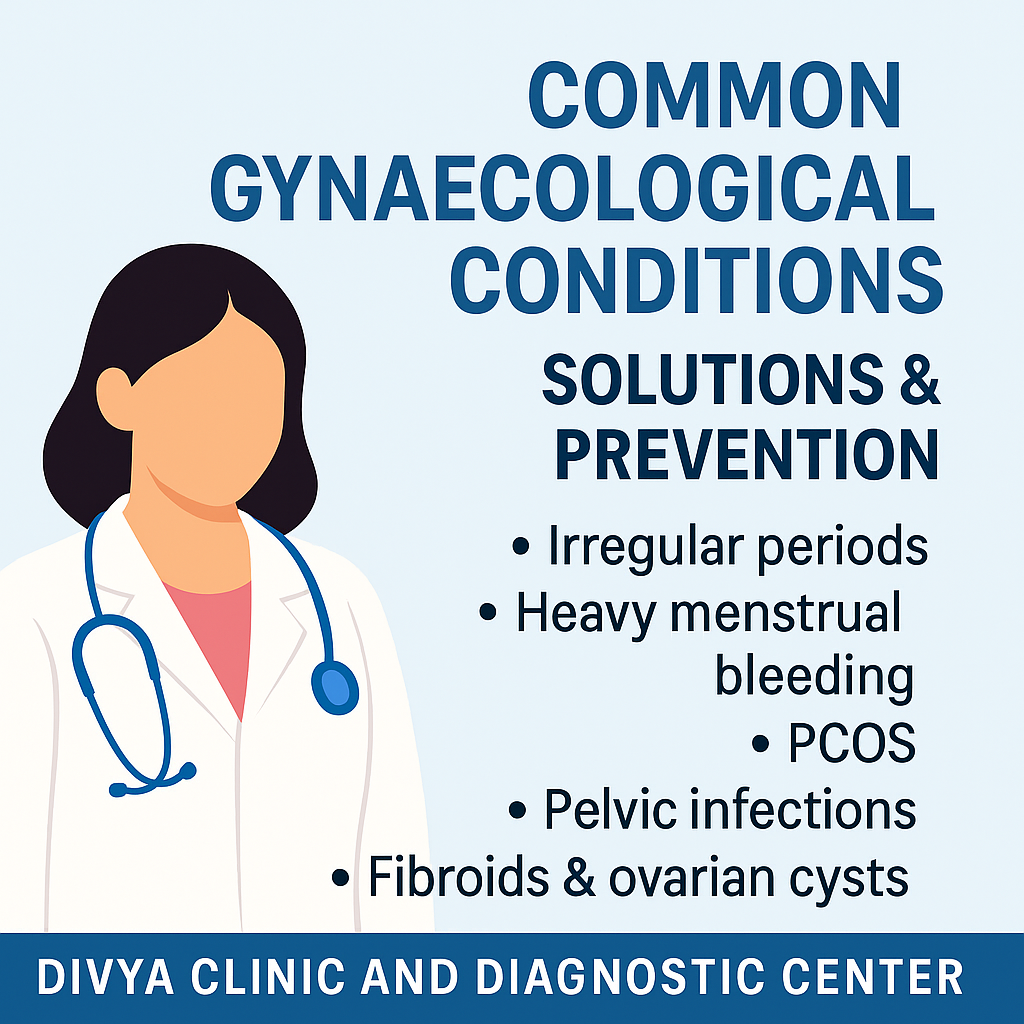Location
-
- Phone : (+977) 041 591077
- Email : [email protected]
- Location : Janakpur-10, Dhanusha

19 Sep
2025
Irregular periods may mean early or delayed cycles, or missed periods altogether. Causes include stress, hormonal imbalance, PCOS, thyroid issues, or lifestyle factors.
Hormonal therapy or medications to regulate cycles
Treat underlying conditions like thyroid or PCOS
Lifestyle changes (diet, exercise, stress control)
Track periods regularly
Avoid extreme dieting or overexercising
Consult early if cycles are consistently irregular
Excessive or prolonged bleeding can cause fatigue, anemia, and disrupt daily life.
Medication to reduce bleeding (tranexamic acid, hormonal pills)
Iron supplements for anemia
Ultrasound to rule out fibroids or polyps
Surgical options (if needed): D&C or hysteroscopy
Don’t ignore frequent changes of pads/tampons
Get a pelvic ultrasound if bleeding persists
PCOS causes irregular periods, acne, weight gain, and excessive hair growth due to hormonal imbalance.
Lifestyle changes: weight loss, low-carb diet
Medications to regulate hormones and induce ovulation
Fertility support if trying to conceive
Early diagnosis can prevent infertility and diabetes
Monitor blood sugar and cholesterol levels regularly
Burning during urination, frequent urge, and pelvic discomfort are signs of UTI.
Antibiotics (after urine culture)
Increased water intake
Good hygiene practices
Avoid using harsh soaps in the genital area
Urinate after sexual intercourse
Don’t hold urine for long periods
Itching, abnormal discharge, odor, and irritation in the vaginal area.
Antifungal or antibiotic vaginal creams or tablets
Treat both partners in some cases
Avoid douching and scented hygiene products
Wear cotton underwear
Maintain proper hygiene
Infection of the reproductive organs, often caused by untreated STIs. Can cause pain, fever, or infertility.
Antibiotic course
Partner treatment
Hospitalization in severe cases
Safe sex practices
Early treatment of vaginal infections and STIs
Benign tumors or fluid-filled sacs in the uterus or ovaries may cause pain, bleeding, or fertility issues.
Medication for symptom relief
Regular monitoring via ultrasound
Surgical removal (if large or symptomatic)
Routine pelvic exams
Don’t ignore heavy periods or pelvic pressure
Inability to conceive after 12 months of unprotected intercourse.
Hormonal and fertility testing (for both partners)
Ovulation induction, ultrasound tracking
Referral for IUI/IVF if needed
Healthy lifestyle and stress reduction
Seek help early — especially after age 30
Hot flashes, mood swings, sleep issues, and vaginal dryness during or after menopause.
Hormone replacement therapy (if suitable)
Vaginal creams for dryness
Calcium, Vitamin D, and lifestyle advice
Regular mammograms and Pap smears
Bone health check-ups
Often symptomless in early stages, cervical cancer is preventable through screening.
Regular Pap smears and HPV tests
HPV vaccination (recommended up to age 26–45)
Start screening from age 21
Avoid smoking and multiple sexual partners
We provide comprehensive care for women’s health with:
👩⚕️ Expert Gynaecologists
🧪 In-house Lab and Ultrasound
👶 Fertility & Pregnancy Care
💬 Confidential Consultations
📍 Location: Janakpur-10, Dhanusha, Nepal
📞 Contact: +977 041 591077
🌐 Website: www.divyaclinicjanakpur.com
Your health is our priority. Book your appointment today for compassionate and professional gynaecological care.
